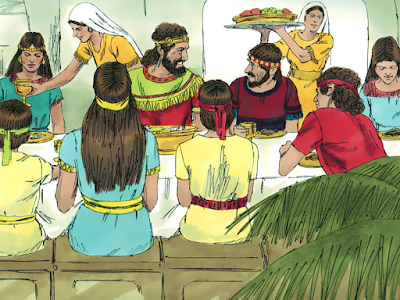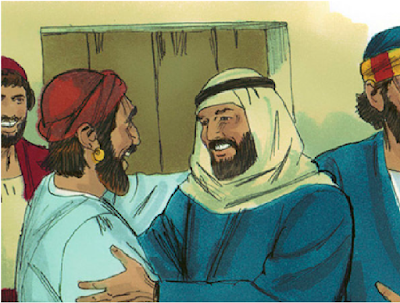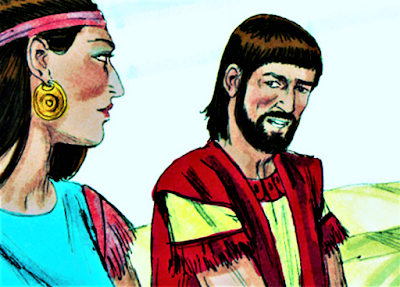David was Kind
2 Samuel 4:4; 9:1-13
Our story comes from the Bible. It is in the book, or part, of the Bible called 2 Samuel. We call it “Second Samuel”. It is the second book in the Bible named after a prophet (a messenger of God) named Samuel.
The Bible tells us about a man named David. David loved God. He was also the king of Israel. David lived in the city of Jerusalem in a great palace, where there was lots of good food to eat every day.
King David thought about a promise he had made years before with his best friend, Jonathan. David and Jonathan promised to always be kind to each other’s families. David wondered what had happened to Jonathan’s family.
One day, David sent for a man named Ziba (“ZEYE-buh”), who used to work for Jonathan’s family. David asked him, “Is there anyone left in Jonathan’s family? Is there anyone I can show God’s kindness to?”
Ziba said, “Jonathan had a son. His name is Mephibosheth (“muh-FIB-oh-sheth”). He is grown up. But when he was little, he had a bad fall and his feet were hurt. Now we can’t walk very well.”
David was glad that he could show God’s kindness to Jonathan’s son. He asked Ziba, “Where is Mephibosheth?”
Ziba answered, “He lives in a town called Lo-debar, far away from here.”
David had Mephibosheth travel to Jerusalem to his palace. Mephibosheth leaned on his crutches, which were long sticks of wood that fit under his arms and helped him to walk. Thump, thump, went the crutches as Mephibosheth slowly walked to see David. As he bowed down in front of David, Mephibosheth wondered why the king had called for him.
David said, “Your father was my good friend. I want to give you back the land that your family used to own. I would like you to live in Jerusalem. That way you will be near me. And you will always eat at my table.”
David asked Ziba to come back. David told him, “I want you and your sons to take care of Mephibosheth’s land for him.”
Mephibosheth was very happy. David had showed God’s kindness to him. Now he had land, a new home, and would always eat at the king’s table.
David showed God’s kindness to Mephibosheth. We can show God’s kindness to everyone.
Our story comes from the Bible. It is in the book, or part, of the Bible called 2 Samuel. We call it “Second Samuel”. It is the second book in the Bible named after a prophet (a messenger of God) named Samuel.
The Bible tells us about a man named David. David loved God. He was also the king of Israel. David lived in the city of Jerusalem in a great palace, where there was lots of good food to eat every day.
King David thought about a promise he had made years before with his best friend, Jonathan. David and Jonathan promised to always be kind to each other’s families. David wondered what had happened to Jonathan’s family.
One day, David sent for a man named Ziba (“ZEYE-buh”), who used to work for Jonathan’s family. David asked him, “Is there anyone left in Jonathan’s family? Is there anyone I can show God’s kindness to?”
Ziba said, “Jonathan had a son. His name is Mephibosheth (“muh-FIB-oh-sheth”). He is grown up. But when he was little, he had a bad fall and his feet were hurt. Now we can’t walk very well.”
David was glad that he could show God’s kindness to Jonathan’s son. He asked Ziba, “Where is Mephibosheth?”
Ziba answered, “He lives in a town called Lo-debar, far away from here.”
David had Mephibosheth travel to Jerusalem to his palace. Mephibosheth leaned on his crutches, which were long sticks of wood that fit under his arms and helped him to walk. Thump, thump, went the crutches as Mephibosheth slowly walked to see David. As he bowed down in front of David, Mephibosheth wondered why the king had called for him.
David said, “Your father was my good friend. I want to give you back the land that your family used to own. I would like you to live in Jerusalem. That way you will be near me. And you will always eat at my table.”
David asked Ziba to come back. David told him, “I want you and your sons to take care of Mephibosheth’s land for him.”
Mephibosheth was very happy. David had showed God’s kindness to him. Now he had land, a new home, and would always eat at the king’s table.
David showed God’s kindness to Mephibosheth. We can show God’s kindness to everyone.
Bible Paraphrase: Love is kind. (Love is patient, love is kind. It does not envy, it does not boast, it is not proud. – 1 Corinthians 13:4 NIV)
Text Truth: God can help us get along.
Have a pretend meal at the king’s palace. Set the table and prepare for a special meal. Dress-up as King David and Mephibosheth. Ask your preschooler what King David and Mephibosheth might have talked about at the table.
You’ll Need: sandpaper, safety scissors, crayons, cardstock, white paper, iron
Cut the shape of a teacup from sandpaper and let your child color the rough sanded side completely. Fold cardstock into quarters. Place the teacup colored side down on the card. Cover it with a sheet of white paper. Press with a warm iron to transfer the teacup shape and color. Give the card away to show kindness.
Read books about showing kindness. Point out kind and unkind characters. Ask your child how unkind characters could show kindness instead.
Use dolls to act out the story. Wrap a strip of cloth around a doll’s leg and make small crutches with sticks and tape them under the doll’s arms. Let your child gather food for Mephibosheth’s family. Then have him take the doll to the table during a meal just as David invited Mephibosheth for a meal.
Pick a family in your community that you don’t know very well. Pray for them every day this week that you could show God’s kindness to them. Thank Him for the opportunities He gives you.
Text Truth: God can help us get along.
Family Devotional
“Don’t be afraid,” David said to him, “for I will surely show you kindness for the sake of your father Jonathan. I will restore to you all the land that belonged to your grandfather Saul, and you will always eat at my table.”
— 2 Samuel 9:7
David went out of his way to be kind to Mephibosheth. He didn’t get a big return and was probably inconvenienced. Yet he did it to keep a promise to his friend and to show Mephibosheth God’s kindness.
In showing kindness to others, you are showing God’s love. Forget about the inconvenience and give your time and money because God wants you to. See others the way God sees them. Allow Him to use you to meet their needs.
God wants us to be kind and care for others. He tells us:
Do what He asks, without hesitation.
In showing kindness to others, you are showing God’s love. Forget about the inconvenience and give your time and money because God wants you to. See others the way God sees them. Allow Him to use you to meet their needs.
God wants us to be kind and care for others. He tells us:
Be kind and compassionate to one another — Ephesians 4:32.
Do what He asks, without hesitation.
Activities You Can Do at Home
Eat at the King’s Table
Have a pretend meal at the king’s palace. Set the table and prepare for a special meal. Dress-up as King David and Mephibosheth. Ask your preschooler what King David and Mephibosheth might have talked about at the table.
Colorful Teacup
You’ll Need: sandpaper, safety scissors, crayons, cardstock, white paper, iron
Cut the shape of a teacup from sandpaper and let your child color the rough sanded side completely. Fold cardstock into quarters. Place the teacup colored side down on the card. Cover it with a sheet of white paper. Press with a warm iron to transfer the teacup shape and color. Give the card away to show kindness.
Books About Kindness
Read books about showing kindness. Point out kind and unkind characters. Ask your child how unkind characters could show kindness instead.
Act out the Story with Dolls
Pray for God’s Kindness
Pick a family in your community that you don’t know very well. Pray for them every day this week that you could show God’s kindness to them. Thank Him for the opportunities He gives you.
-
Story illustrations are the copyright of Sweet Publishing and licensed by FreeBibleimages (http://freebibleimages.org) for free download under the terms of the Creative Commons Attribution Share-alike 3.0 unported licence.
-












Comments
Post a Comment